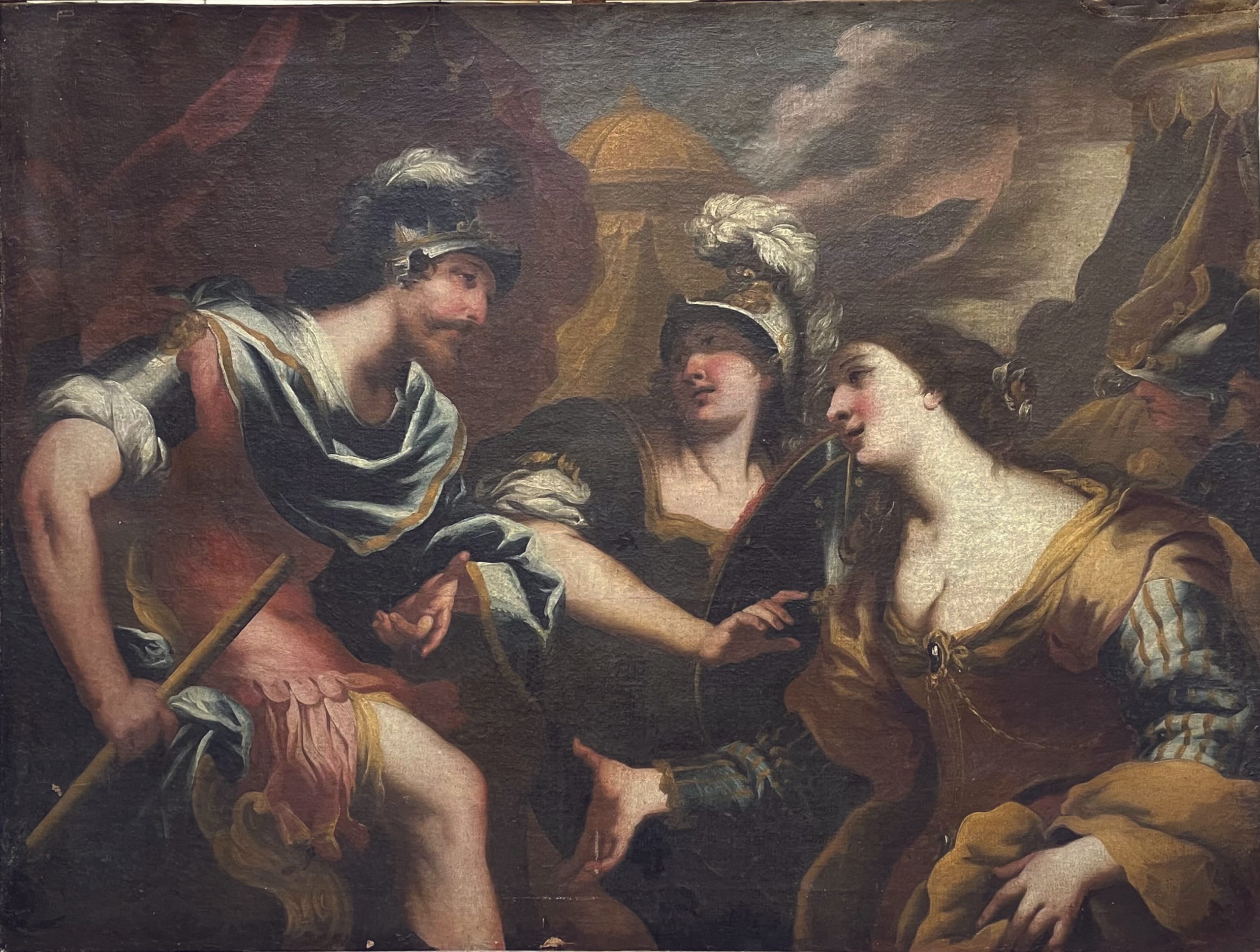This article delves into the captivating and often tragic lives of two prominent Persian women, both named Stateira, who navigated the tumultuous world of ancient empires. Their stories, intertwined with the conquests of Alexander the Great, offer a glimpse into the complexities of power, love, and loss in a pivotal period of history.
Stateira I: Queen in Captivity
Following the Battle of Issus in 333 BC, the Persian Empire crumbled under the advance of Alexander the Great’s Macedonian armies. Among those captured was Stateira I, the wife of Darius III, King of Persia. This dramatic shift from queen to captive likely inflicted immense emotional and psychological distress. However, historical accounts suggest that Alexander treated Stateira I and her family with respect and dignity. This probably reflects Alexander’s political acumen; by showing courtesy to the captured royal family, he likely aimed to pacify the conquered population and legitimize his own rule. Despite this relatively fortunate treatment, Stateira I died of natural causes in early 332 BC while still in Alexander’s custody. This event symbolized not only a personal tragedy, but also the symbolic end of an era for the Persian monarchy. Her story represents the countless individuals whose lives were irrevocably altered by the forces of war.
Stateira II: Princess, Wife, and Victim
Stateira II, daughter of Darius III and Stateira I, experienced a different, yet equally compelling, trajectory. Captured as a child after the Battle of Issus, she grew up under the guardianship of her grandmother, Sisygambis, in the shadow of Alexander’s burgeoning empire. In 324 BC, she became Alexander’s second wife in a grand, politically orchestrated mass wedding ceremony in Susa. Some sources, such as Arrian, refer to her as “Barsine,” suggesting this may have been her formal name while “Stateira” was a more common appellation. This ambiguity adds another layer to the mystery surrounding her identity.
This marriage, a strategic union intended to consolidate Alexander’s control over Persia and symbolically unite the Macedonian and Persian empires, placed Stateira II at the heart of a complex power dynamic. Did Alexander Have a Relationship with Stateira? While some historians believe the marriage was purely a political alliance, others suggest the possibility of genuine affection. It’s one of those historical mysteries that keeps us guessing.
Tragically, just a year later, in 323 BC, Stateira II was murdered, likely on the orders of Roxane, Alexander’s first wife. Jealousy and a desire to secure her own son’s claim to the throne were probably Roxane’s primary motives. What happened to Alexander the Great’s wife? Stateira II’s murder underscores the precarious position of women, even those of royal lineage, in the ancient world and the often brutal consequences of political ambition. This act also extinguished the hope of a smooth transition of power and a unified Greco-Persian empire, throwing the region into further turmoil. What happened to Darius’s wife?
Did Alexander Have a Relationship with Stateira?
The nature of Alexander the Great’s relationship with Stateira II remains a subject of historical debate. Their marriage, undoubtedly a strategic move to consolidate his control over the Persian Empire, raises questions about the presence of genuine affection. Ancient historians offer conflicting accounts, some portraying it as a purely political alliance, others hinting at a deeper connection. Disentangling political strategy from personal feelings proves challenging given the limitations of historical sources, which were often written centuries after the events and imbued with their own biases. Did you know that the mysterious telkhine were sorcerers who practiced magic in ancient Greek mythology? Their influence, like the nuances of historical narratives, can be difficult to discern.
Alexander’s strategic brilliance is undeniable; marrying Stateira integrated him into the Persian power structure and demonstrated respect for their customs, crucial for maintaining stability. However, this doesn’t preclude the possibility of genuine affection. Alexander, a complex individual capable of both calculated pragmatism and passionate attachments, might have felt both political expediency and personal inclination toward Stateira. Her perspective remains largely unknown, adding to the enigma. Limited historical glimpses leave us speculating about her feelings towards this politically charged union. Ongoing research may offer new insights, but the full extent of their relationship may remain shrouded in mystery.
The tragic assassination of Stateira by Roxane, Alexander’s first wife, after his death in 323 BC underscores the volatile atmosphere of the Macedonian court. Roxana likely perceived Stateira as a threat to her son’s claim, further demonstrating the dangerous intertwining of personal relationships and political machinations in the ancient world.
What happened to Darius’s wife?
After Darius III’s defeat at the Battle of Issus, his wife, Stateira I, along with his mother, children, and other family members, were captured by Alexander. Contrary to expectations of harsh treatment, Alexander exhibited surprising chivalry, ensuring their safety and comfort. This act likely served multiple purposes: presenting himself as a magnanimous victor, potentially pacifying the Persian populace, and perhaps even encouraging Darius to negotiate.
Unfortunately, despite this respectful treatment, Stateira I died shortly after her capture. Historical accounts generally attribute her death to natural causes, possibly illness compounded by the stress and trauma of her circumstances. While this theory prevails, the limitations of historical records necessitate caution. Further research into ancient medical practices could provide more definitive answers, though some questions may remain unanswered due to the passage of time and fragmentary sources.
Years later, Alexander married Stateira’s daughter, also named Stateira, further entwining their families’ destinies. This strategic marriage aimed to solidify his claim over the Persian Empire, uniting the Macedonian and Persian royal lines and fostering cultural integration. Some historians suggest this also served as a gesture of reconciliation, potentially honoring the memory of Stateira I.
What happened to Alexander the Great’s wife?
Stateira II, Alexander the Great’s second wife and daughter of Darius III, met a tragic end intertwined with the power struggles following Alexander’s unexpected death in 323 BC. Their marriage, a significant political maneuver to unite the Macedonian and Persian empires, remains a subject of historical debate regarding the depth of their relationship. Was it purely strategic, or did genuine affection exist? The answer remains elusive.
Alexander’s death created a power vacuum, with various factions vying for control. Roxana, his first wife, fiercely protective of her son’s claim to the throne, perceived Stateira II and her potential offspring as a direct threat. Consequently, Roxana likely orchestrated Stateira II’s assassination, a brutal act designed to eliminate a rival and solidify her son’s position.
This act highlights the precarious position of women, even royal ones, within the intensely competitive political landscape of the ancient world. Stateira II became a pawn in a larger power struggle, her fate a tragic consequence of circumstances beyond her control. Some historians speculate that her murder also aimed to destabilize the fragile peace between Macedonians and Persians, eliminating a symbol of unity and exacerbating existing tensions. Stateira’s demise underscores the volatility of Alexander’s vast, rapidly acquired empire, lacking a clear succession plan and vulnerable to internal conflict after his death.
While the narrative surrounding Stateira II remains incomplete, ongoing research and new interpretations may shed further light on her life, relationship with Alexander, and the circumstances surrounding her tragic death. For now, her story serves as a poignant reminder of the human cost of ambition and the precarious nature of power in antiquity.
- Unlock Filipino Culture: A Deep Dive into Traditions and Practices - April 23, 2025
- Unlock Spanish Culture: Insights & Opportunities Now - April 23, 2025
- White Spirit Uses & Substitutes: A Deep Dive for Pros & DIYers - April 23, 2025
















